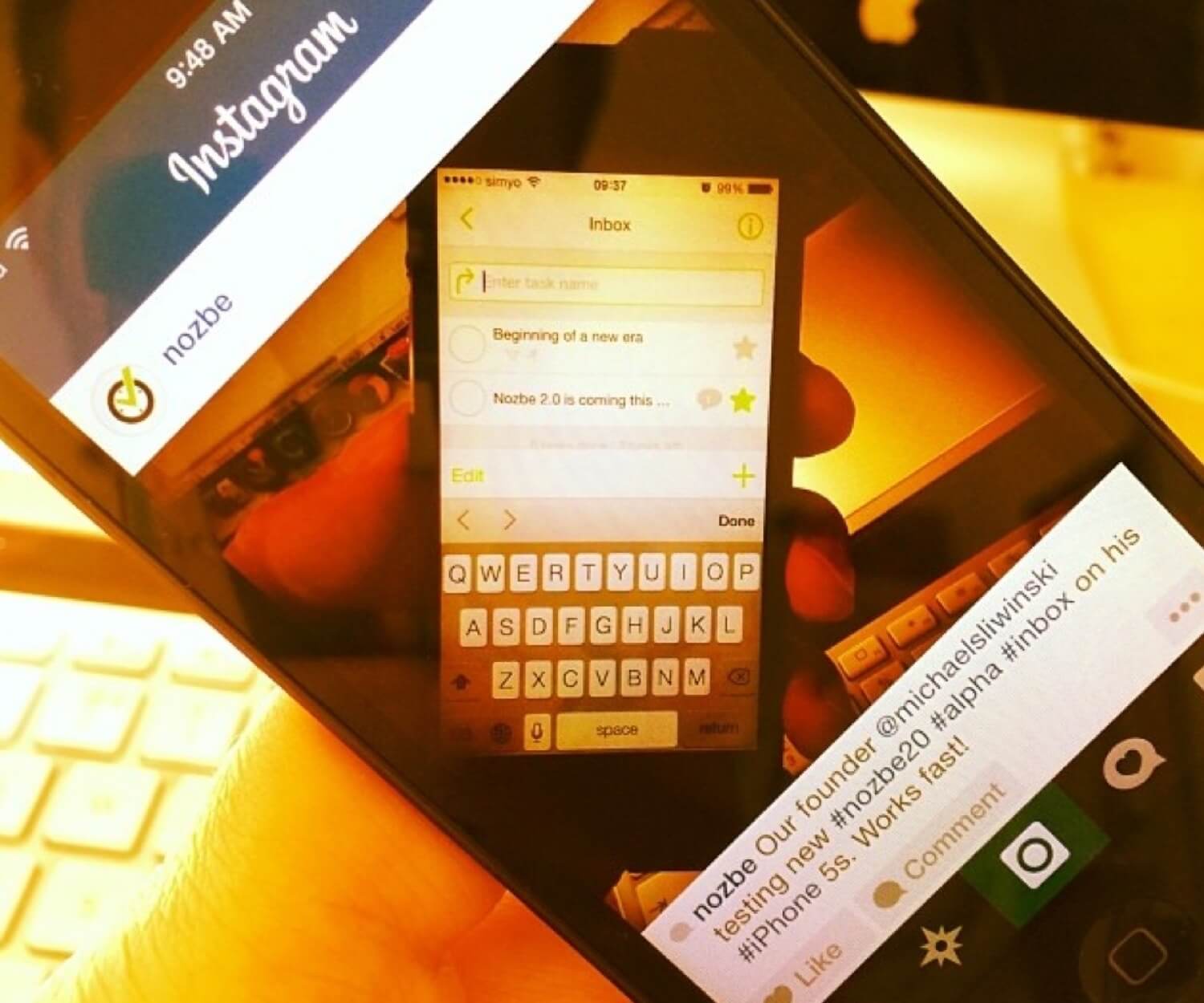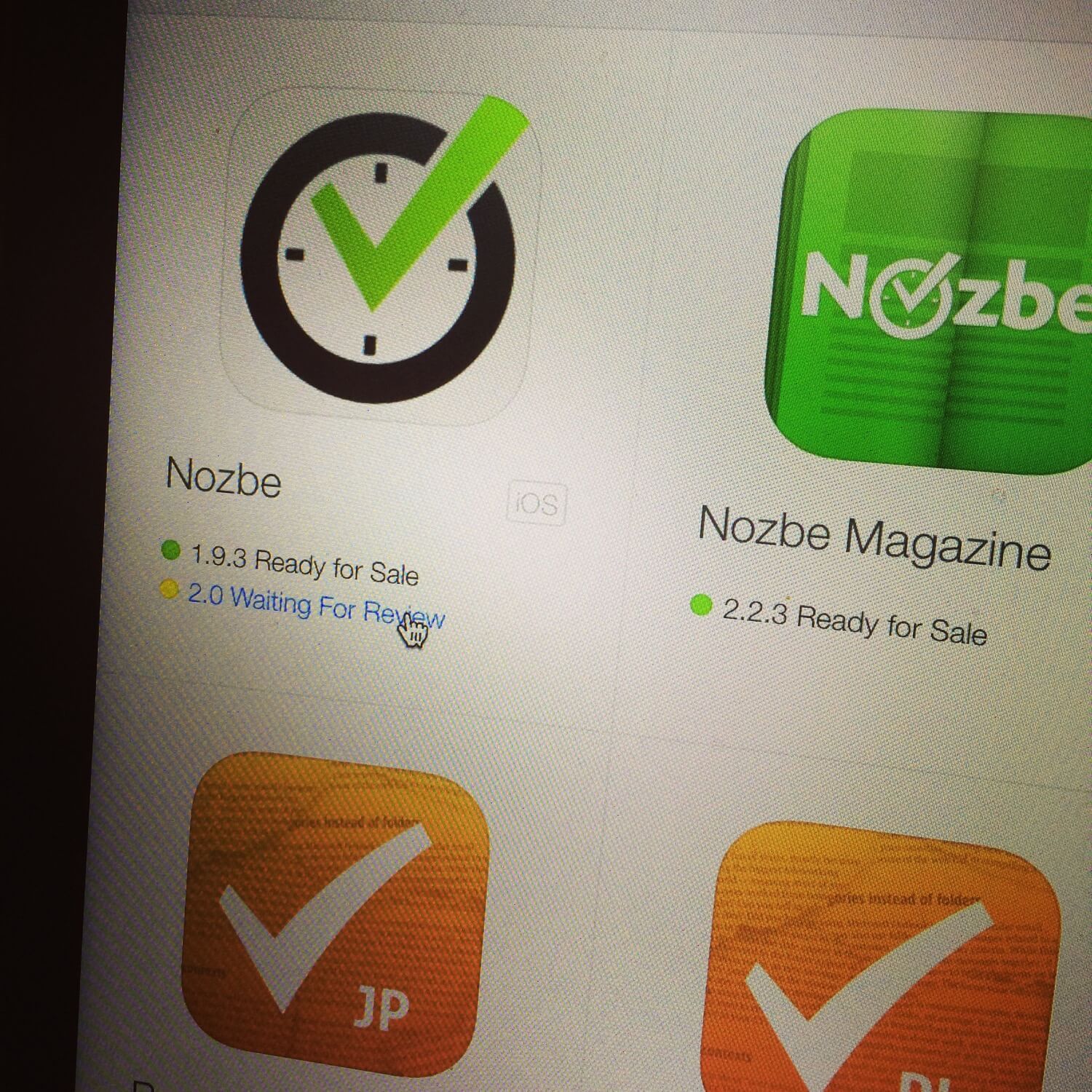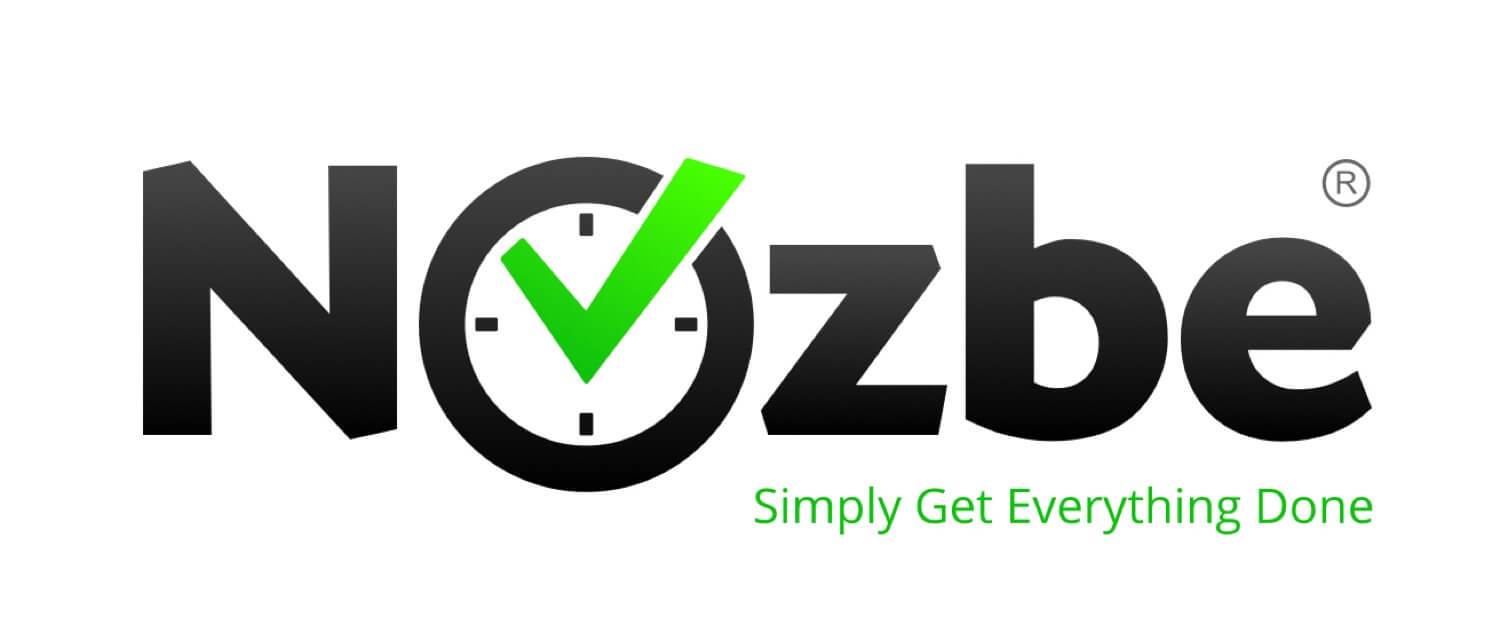Chapter 4 - Passion 3: Product
You will develop a passion for your product!

“Pleasure in the job puts perfection in the work.”
- Aristotle
- You’re building a great product, right?
- Every startup product is in constant “beta”
- “Product people” rule the world
- Eat your own dog-food
- Learn to say NO
- Kaizen - continuous improvement
- Find a mission or slogan or headline for your product
- Your surprising product
- Passion for a product spirals even further…
You’re building a great product, right?
Every startup builds a product or service. A service is a product itself so let’s cut it short to the fact, that whatever your startup is building, is a product. Facebook, Twitter, Google Search, Yahoo Portal, eBay… these are all products just like Apple’s Macbook Air or Mac OSX.
My Nozbe is my product. I built it because I needed it. Not because I wanted to prove something to someone, or because I wanted to earn money. I needed this product and I built it… and more than 7 years in, I keep on building it.
Every startup product is in constant “beta”
When Gmail (Google Mail) launched in beta it stayed like this for more than two years… and then they removed the “beta” sign… although they could have kept it indefinitely. Gmail keeps on evolving, changing and getting better. It really is at beta stage all of the time.
Same applies to your startup product. If you’re passionate about it - you want to constantly improve it. You want it better every day. You physically suffer if it doesn’t meet your expectations… and it never does. Because you know it can be so much better.
“People don’t want a perfect product… what they want is a passionate person behind the project. If you can show people you are passionate about creating a perfect product by releasing it, then getting feedback and iterating…then people will jump on board…especially if the product solves a real-world problem.”
- Neil Patel, blogger, co-founder of KISSmetrics
“Product people” rule the world
Remember Bill Gates? When he was in charge of Microsoft, he was all about his products. He was the mastermind behind Windows and Office… and these two products now pay for all Microsoft’s other ventures. Now that Steve Ballmer (a sales guy) was in charge, Microsoft started going down…
What happened to Apple? How did it rise from the ashes? They got Steve Jobs back on board… and he was the “product” guy - he was fascinated by what they were building and he could go on and on about their “awesome” and “amazing” products. When he pronounced the iPad as a “magical device” I bet he really believed it. I did. And I still do. And I wrote this entire book on my iPad actually.
If you really want to build a fantastic startup, you must be a “product guy”. You must seriously care about your product. You’ve got to have this passion for your product deep inside of you.
Eat your own dog-food
I love this saying as it’s so “doggy”. Now many people prefer the more positive version though: “sip your own champagne” - but it implies your product is perfect… and it never is - so let’s just stick with the dog-food.
Eating your own dog-food means you must use your product every day. Every single day. There’s no other way around it. And not just use it. You have to be your own “power user”. It’s the only way to stay passionate about your product - when you use it daily and you see it through the eyes of your customers who do use it all the time.
Don’t use a special version of your product.
Before we ship a major new release of Nozbe with some cool new features we do test it on our “development server” and I also do the testing myself. However I work in the “production version” of Nozbe where I have all my projects and tasks. I use the same version as my customers.
I do it mainly to make sure I feel the same things the customers feel. If we introduce a cool new feature, I can see myself how it performs in real life by using it together with my users. If the feature is buggy, I feel their pain and I’m desperate for a fix as much as the next guy. I’m in my users’ shoes and I feel them all the way.
When I stopped eating my dog-food, things went bad.
When we developed our initial version of our Android client, I was testing it with some sample data but as an iPhone user I didn’t bother to sync my real data with it. I decided it wasn’t all that important… but the app wasn’t getting good reviews and some customers where unhappy.
And then I decided to use it and carry the Android phone with me. The first thing that happened? The app crashed on my first sync. I called up my CTO and he said there was a bug that a big Nozbe account could not sync with the app… I was horrified. My power users were complaining for a good reason. The app sucked. We worked it and when we fixed it the next weeks I was using the Android app every day, syncing with my desktop app (also in “beta”).
If I hadn’t used the app myself, we would have spotted the bug later, upsetting even more people along the way. That’s why it’s so fundamental to keep eating your own dog-food. Only this way I’m truly passionate about my product.
“Creating software for other people is really hard. It’s so much easier to create something for yourself. And when you are creating something for yourself, you are the customer, too. You’re not the only customer, you don’t have all the answers, but you should have a fair amount of the answers and if you look at pretty much any sort of widespread, successful product or start-up out there, the creators of those services or tools, they damn well use their own product.”
- David Heinemeier Hansson, co-founder of Basecamp

Learn to say NO
Saying NO is a skill. Especially in relationships. I’m this kind of person who’d always want to make everyone happy and I used to say YES all the time. Until my commitments list just grew so big that I simply couldn’t keep up with it and almost blew out. Every relationship counselor will tell you that you’ve got to be assertive - you have to know when it’s perfectly OK to say no and how to do it in order not to hurt the other person’s feelings.
Saying NO to feature requests is one of the most important skills a startup team can master.
When users are passionate about your product, they’ll send you lots of feature requests. It’s a good thing. You should read them and reply. But it doesn’t mean you’re supposed to say YES to all these requests.
People send in some great ideas… but many of these are good just for their particular case… and you want to build a great product for all of your customers. You need to make sure you say NO. It hurts. It may disappoint some folks. But it needs to be done like this. There’s just no other way around it.
Politely decline… like the Japanese do. Learn from them.
At Nozbe we have a great (and a very passionate) user base in Japan and I get to travel there from time to time. It’s an amazing country and these are some of the most amazing people I know. They have impeccable manners and they never say NO directly in your face. They do decline but as they don’t want to hurt your feelings, instead of flat-out saying NO they just seem confused.
Act confused, too. That’s what I do when I get a feature request I don’t want to implement - I ask back, explain why this doesn’t make sense in my app. I try to show the customer how I really do appreciate their support, but what they are asking is simply something that can’t be done without hurting other people’s user experience. And hardly anyone wants to hurt other folks.
After all, you are a curator of your own museum. Act like one.
Jason Fried of 37signals has this great analogy of startup “builders” being like curators of a museum. You get to choose which artworks go into your museum. You know the size constraints of your museum. You feel the flow of a visit in your museum. You are a curator and you get to say YES and NO.
The same applies to your startup product. You get to choose. You know what’s best. Especially if you eat your own dog-food and really have the feel for what you’re building.
It’s great for your customers to suggest things. It’s your job to listen and learn from them. But it’s your duty to curate your own product and be bold enough to say NO when you have to. You have the full picture and the vision of your product. You see the whole thing. You decide.
“Whether it is building an intricate replica model of an ancient ship, or pulling an all-nighter to write a song or map out an idea for a new business, you do it because you love it. If you can put «work with intention» at the center of your efforts, you’re more likely to make an impact in what matters most to you.”
- Scott Belsky, author of “Making Ideas Happen”
Kaizen - continuous improvement
I know, I can’t stop talking about the Japanese but bear with me this last time. They have this word “Kaizen” that stands for continuous improvement. Step by step. Japanese believe that great products are being built with very small steps forward. Even a small change can make the product better. The devil lies in the details, as they say.
Keep improving and shipping. And repeating the process.
Seth Godin in his presentation about “the lizard brain” said something really worth emphasizing here: “Your job is not to be creative. You’re too creative already. Your job is to ship.”
That’s it. Keep shipping. Keep changing the product. Keep tweaking the copy of your marketing web site. The copy of your app. Even a small detail can improve your user’s experience. Just change a dialog box, rename a button… and suddenly many of your users seem less confused and stop emailing what you consider “stupid” questions.
It’s great you’re working on a “major rewrite” of your software but your customers really don’t care about it unless you ship it. I know. We have been working on version 2.0 of Nozbe for almost a year now. Many of our customers are getting tired of waiting and want to move on. That’s why we keep on improving the 1.9.X version of Nozbe as much as we can to keep them happy and productive while we finish the final touches on Nozbe 2.0.
Ship as often as you can. Keep making small improvements.
Many startups implement “agile programming” techniques or SCRUM or other systems… and it’s great - but what it ultimately comes down to is to be able to quickly iterate and ship a new version in a matter of weeks or days… and not months or years. You are a fast-moving startup. Your advantage over Microsoft and Google is that you can ship quickly and early and constantly (although check out the Google Chrome team - they ship really fast and iterate very quickly).
My team at Nozbe is by no means perfect here. While we keep iterating on our product faster than we used to, supporting all of the major platforms has its challenges, but we do it anyway to be able to offer Nozbe for: Web, Mac, Windows, iPhone, iPad and Android. But ask our customers, we’re getting better at this, we ship at least one new version of Nozbe per month… and with Nozbe 2.0 we’re finally there to have continuous deployment in place and ship each version even faster.
This is when your passion for your product really shines - when you learn to ship quickly, work on the details and care for the small things and get to show it to the people who care about your product as much as you do - your customers.
“We do many things at Automattic, but our core passion is creating great products. When we see something we feel isn’t our best work it bugs us until we’re able to loop back and iterate on it — it’s a blessing and a curse.”
- Matt Mullenweg, creator of Wordpress

Find a mission or slogan or headline for your product
Out of my passion for Nozbe came our main “slogan” which says: “Simply Get Everything Done!”.
It seems trivial, but each part of that sentence stands for something:
- Simply - our product needs to be simple. People should be able to use it without a manual. All the decisions we make should go towards this goal. Too many taps? Too many clicks? Not simple enough? How to simplify this? We keep on asking this questions every day.
- Get Done - our product needs to help people complete things, finish stuff. Many to-do or project management apps focus on the “management” part too much. They let users fiddle too much with their tasks and projects. We are not a “task manager”, we are a “task doer” - with Nozbe you get things done first, and manage stuff later.
- Everything - our product works for both your personal as well as professional life. While logged in to my Nozbe account I manage both my company as well as my family projects and tasks. We run customer support, product development and everything else through Nozbe - our product should be versatile enough to help us do all we need to accomplish our goals. That’s why we also integrate Nozbe with Dropbox, Box, Evernote and other apps.
With our new Nozbe 2.0 we took it even to a new level by nicknaming this release “OneNozbe”. What it means is that Nozbe should feel the same way on the mobile platforms as well as on the desktop ones. Whenever we make a UI decision, we keep asking ourselves how it would impact other devices, how would it work on larger or smaller screen sizes. It has to “feel” as OneNozbe. Same application, same feel, but created perfectly for each screen size and device.
As you can see, this passion for product results in slogans or nicknames that not only help you identify yourself with your product, but also influence your decisions on each level in the company. And my job as the CEO is to be really passionate about guarding the product by questioning each decision according to what we believe in.
Your surprising product
As with previous types of passion - my passion for product brought a few surprises that literally blew me away.
Surprise 1. You got yourself a great product.
The first and the most obvious one is that ultimately you’ll have a great product. When you’re passionate about it, it’s going to “grow up” beautifully and you’ll be amazed to see what you’ve created. Your customers will appreciate it so much.
My personal assistant said to me one day: “Michael, I love working for you and managing your email because every day at least one person writes to you to thank you for Nozbe and for what you’re doing. This makes me so happy!”. If it makes my assistant happy, think about how it makes me feel. This is why I wouldn’t change this job for anything else. Being passionate about your product really pays off.
Surprise 2. You’ve built trust and bond with your users
Over the years of running Nozbe I saw many competitors show up with some really cool ideas… but they ultimately faded away and users who signed up for their service later started searching for alternatives and found my Nozbe.
What happened is that when people see your product is not moving fast, is not getting better and is not being worked on, they feel cheated. Yes, cheated. They have invested their time and energy (and probably even money) to support your product and it turns out they are more passionate about it than the people who actually build it. It’s not fair.
That’s why it’s key to keep on improving and shipping. When you do that, people notice and feel you are all on the same boat. You build a bond of trust that reassures your customers you are worthy of their support.
Surprise 3. The word about your passion spreads
My app’s marketing depends mostly on the word of mouth. When my customers notice I’m passionate about my product and I’m making it better, they feel comfortable sharing good word about it to their peers. They don’t feel cheated recommending something that is not being improved and worked on. They feel they can spread the word and their reputation will not be on the line, because you care and you’re truly passionate about your product. They remember how your product makes them feel and they’d be happy to pass this feeling on to others.
Passion for a product spirals even further…
When you’re passionate about your product, you begin to understand your customers a lot more… and this leads to being more involved with your industry and by trying to contribute more and share more, in the end you end up having passion for it. This is what happened to me - and we’ll discuss this in the next chapter.